Abstract
The effects of insulin on glucose uptake and lactate release in the perfused working rat heart have been investigated in three types of preparation: (i) a control low-workload preparation; (ii) an increased-pressure-workload preparation, simulating conditions of aortic pressure encountered in vivo; (iii) an increased-volume-workload preparation, where pumping work done is approximately the same as (ii) but coronary flow is restricted because of the decreased aortic pressure. Insulin stimulated glucose uptake and lactate release in preparations (i) and (ii), but failed to do so in preparation (iii). It was considered possible that preparation (iii) was hypoxic, thus necessitating a maximal stimulation of glucose uptake. This was confirmed by improving cardiac oxygenation by addition of stroma-free haemoglobin to the perfusate in preparation (iii). Under these conditions in the absence of insulin, glucose uptake and lactate release were decreased compared with perfusions in the absence of haemoglobin. Insulin stimulation of both processes was restored. We conclude that the failure of other workers to observe insulin effects on glucose uptake and lactate release under physiological workloads [preparation (ii)] may be a consequence of intracellular hypoxia in their preparations.
Full text
PDF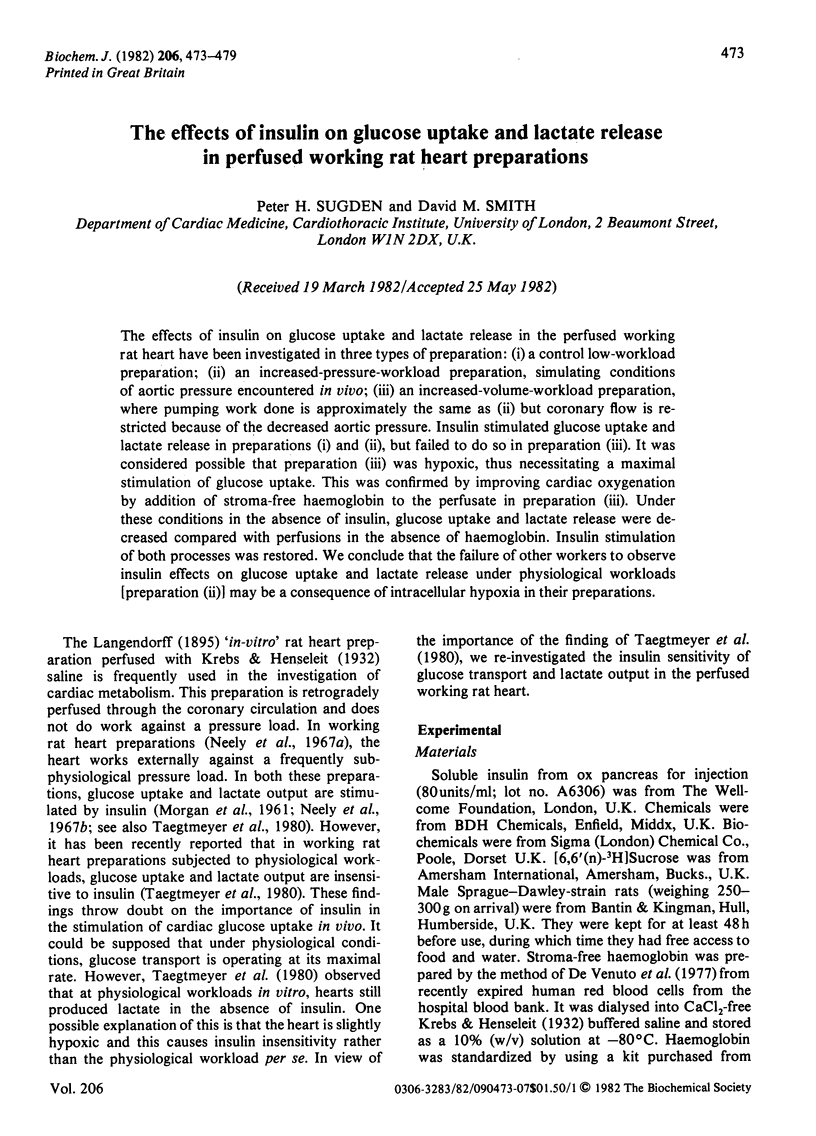
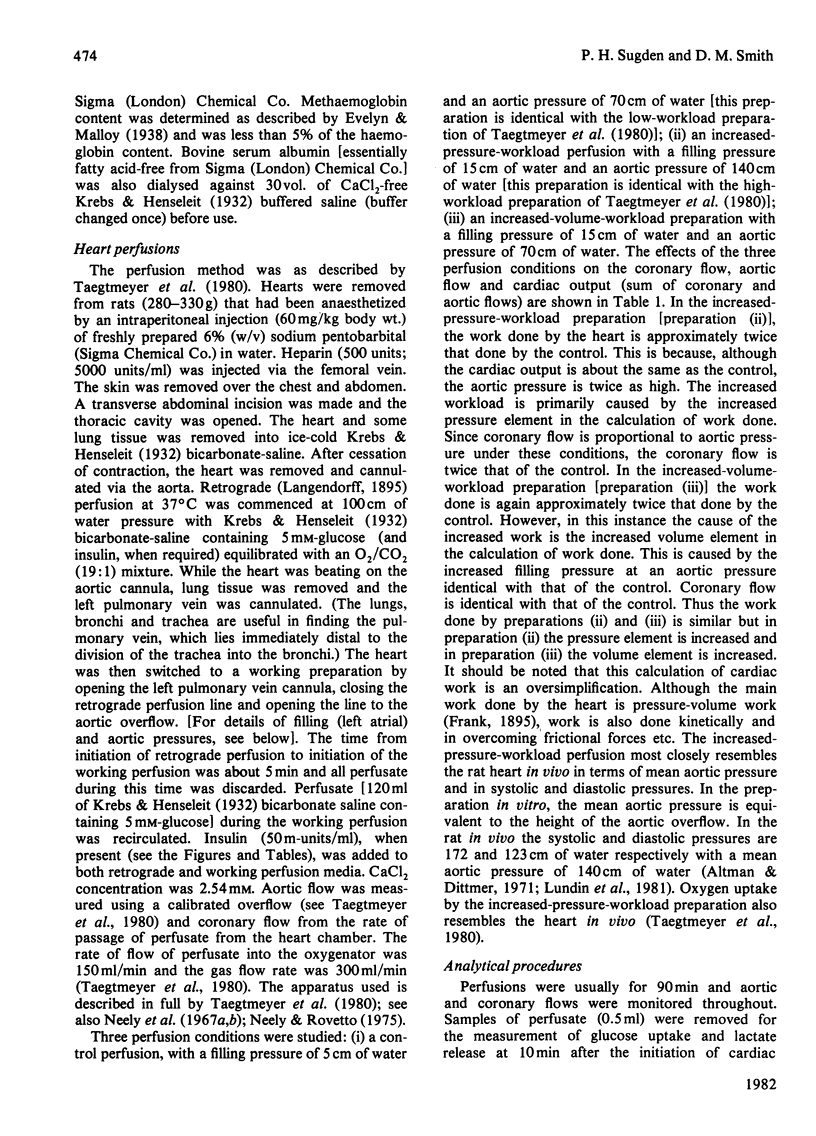
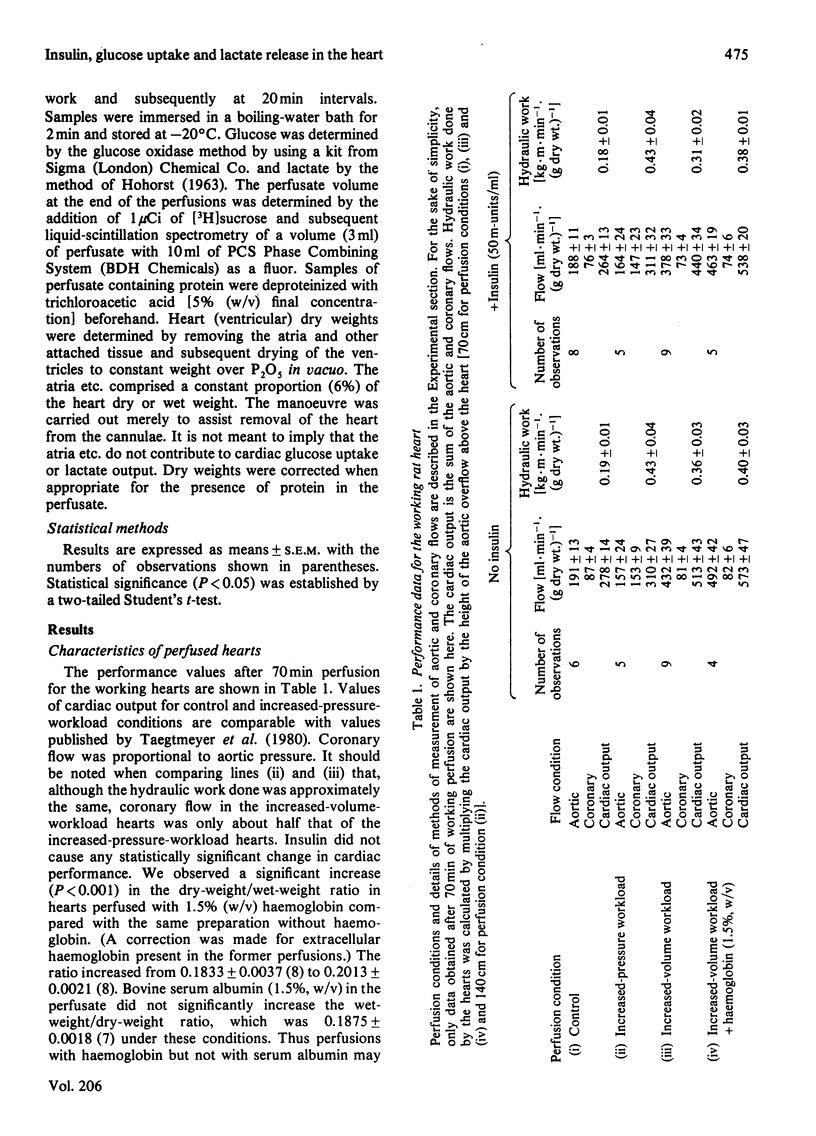
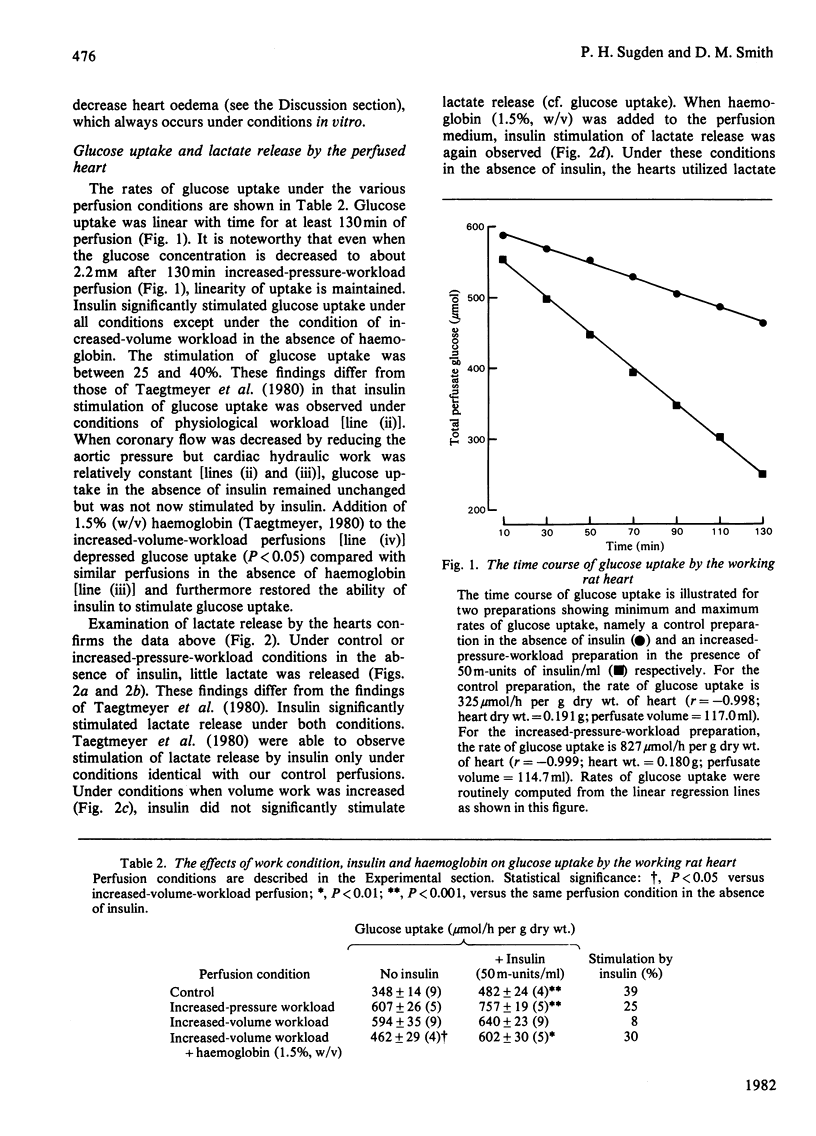
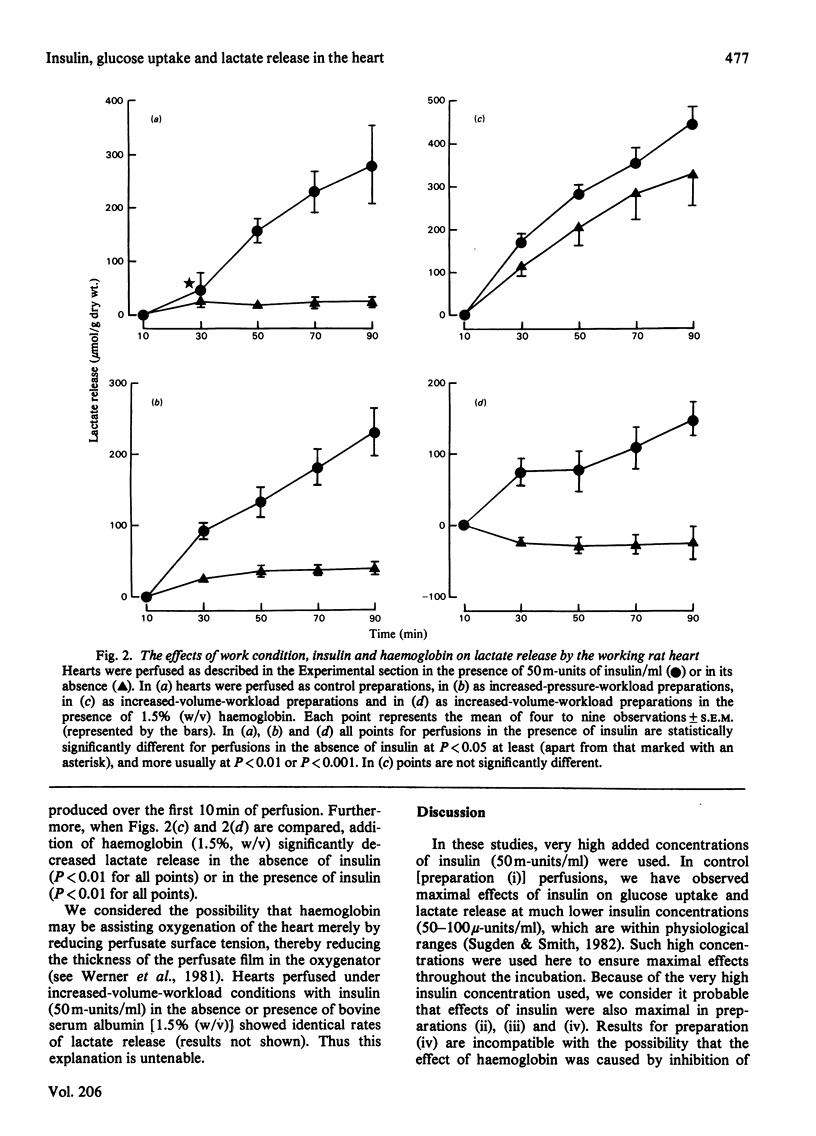
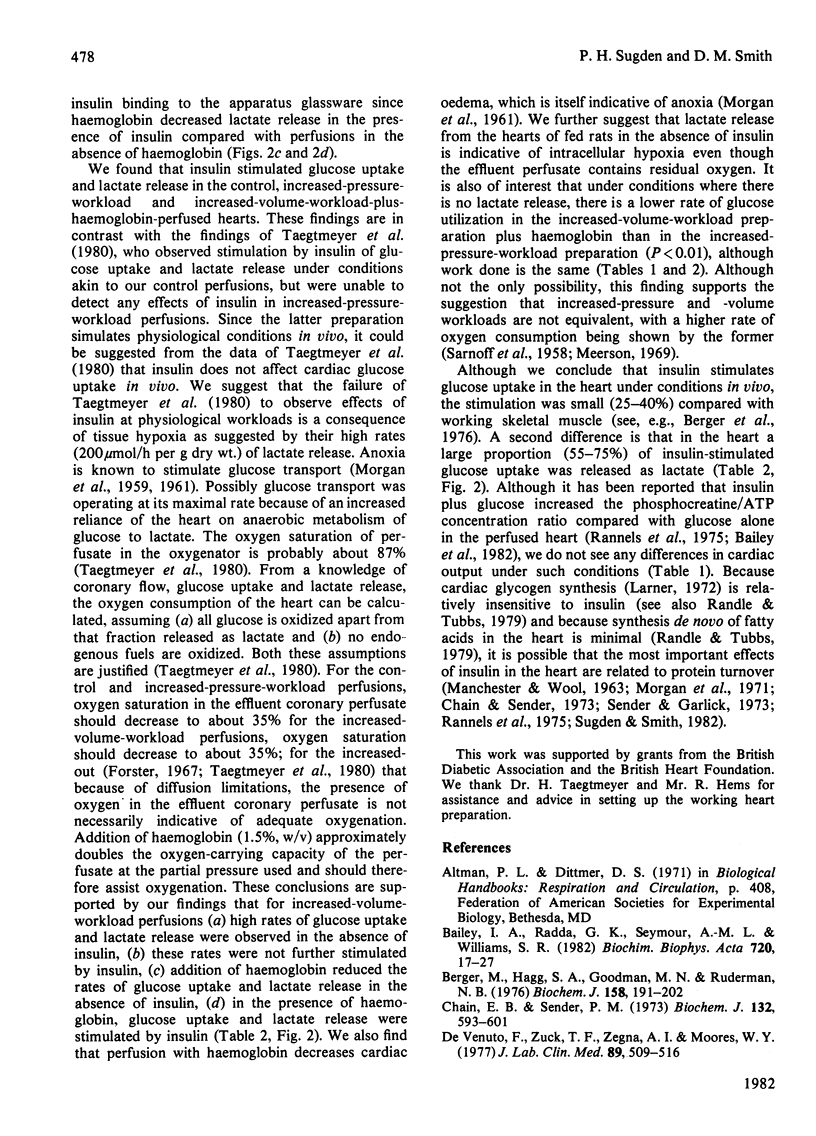
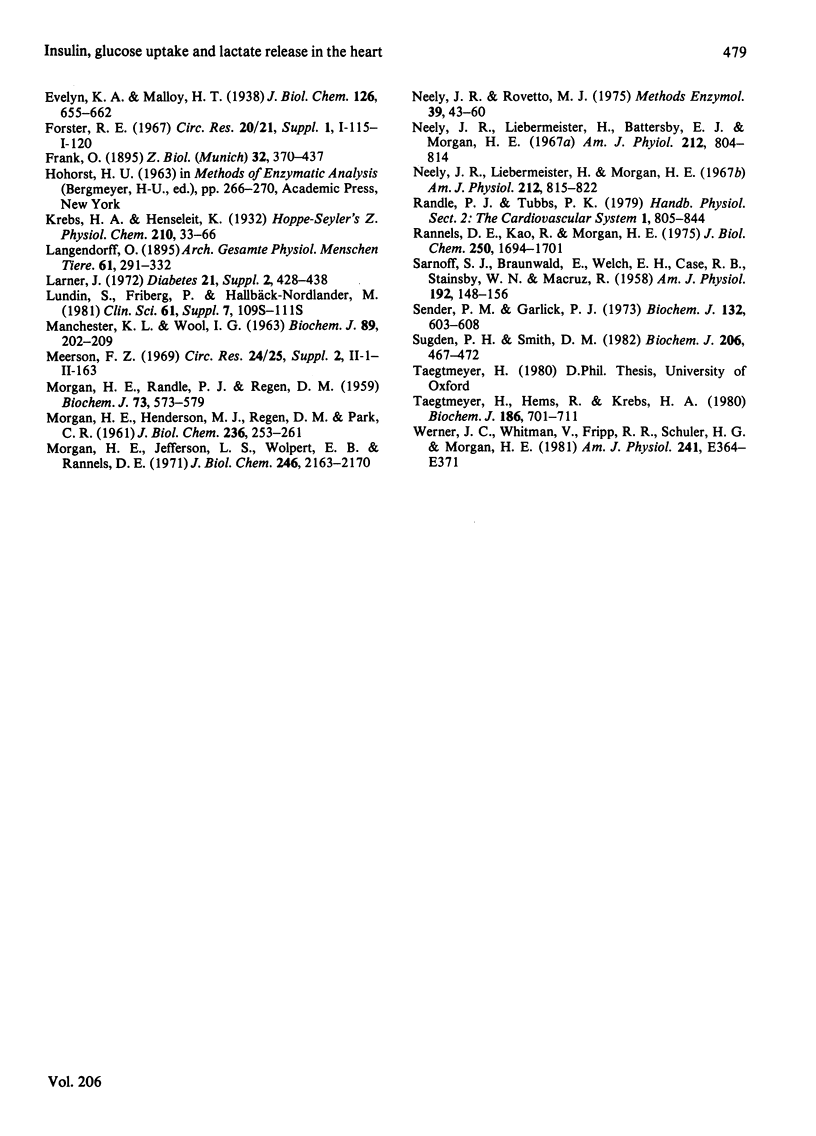
Selected References
These references are in PubMed. This may not be the complete list of references from this article.
- Bailey I. A., Radda G. K., Seymour A. M., Williams S. R. The effects of insulin on myocardial metabolism and acidosis in normoxia and ischaemia. A 31P-NMR study. Biochim Biophys Acta. 1982 Feb 10;720(1):17–27. doi: 10.1016/0167-4889(82)90034-9. [DOI] [PubMed] [Google Scholar]
- Berger M., Hagg S. A., Goodman M. N., Ruderman N. B. Glucose metabolism in perfused skeletal muscle. Effects of starvation, diabetes, fatty acids, acetoacetate, insulin and exercise on glucose uptake and disposition. Biochem J. 1976 Aug 15;158(2):191–202. doi: 10.1042/bj1580191. [DOI] [PMC free article] [PubMed] [Google Scholar]
- Chain E. B., Sender P. M. Protein synthesis by perfused hearts from normal and insulin-deficient rats. Effect of insulin in the presence of glucose and after depletion of glucose, glucose 6-phosphate and glycogen. Biochem J. 1973 Mar;132(3):593–601. doi: 10.1042/bj1320593. [DOI] [PMC free article] [PubMed] [Google Scholar]
- De Venuto F., Zuck T. F., Zegna A. I., Moores W. Y. Characteristics of stroma-free hemoglobin prepared by crystallization. J Lab Clin Med. 1977 Mar;89(3):509–516. [PubMed] [Google Scholar]
- MANCHESTER K. L., WOOL I. G. INSULIN AND INCORPORATION OF AMINO ACIDS INTO PROTEIN OF MUSCLE. 1. ACCUMULATION AND INCORPORATION STUDIES WITH THE PERFUSED RAT HEART. Biochem J. 1963 Nov;89:202–209. doi: 10.1042/bj0890202. [DOI] [PMC free article] [PubMed] [Google Scholar]
- MORGAN H. E., RANDLE P. J., REGEN D. M. Regulation of glucose uptake by muscle. 3. The effects of insulin, anoxia, salicylate and 2:4-dinitrophenol on membrane transport and intracellular phosphorylation of glucose in the isolated rat heart. Biochem J. 1959 Dec;73:573–579. doi: 10.1042/bj0730573. [DOI] [PMC free article] [PubMed] [Google Scholar]
- Morgan H. E., Jefferson L. S., Wolpert E. B., Rannels D. E. Regulation of protein synthesis in heart muscle. II. Effect of amino acid levels and insulin on ribosomal aggregation. J Biol Chem. 1971 Apr 10;246(7):2163–2170. [PubMed] [Google Scholar]
- Neely J. R., Liebermeister H., Battersby E. J., Morgan H. E. Effect of pressure development on oxygen consumption by isolated rat heart. Am J Physiol. 1967 Apr;212(4):804–814. doi: 10.1152/ajplegacy.1967.212.4.804. [DOI] [PubMed] [Google Scholar]
- Neely J. R., Liebermeister H., Morgan H. E. Effect of pressure development on membrane transport of glucose in isolated rat heart. Am J Physiol. 1967 Apr;212(4):815–822. doi: 10.1152/ajplegacy.1967.212.4.815. [DOI] [PubMed] [Google Scholar]
- Neely J. R., Rovetto M. J. Techniques for perfusing isolated rat hearts. Methods Enzymol. 1975;39:43–60. doi: 10.1016/s0076-6879(75)39008-3. [DOI] [PubMed] [Google Scholar]
- Rannels D. E., Kao R., Morgan H. E. Effect of insulin on protein turnover in heart muscle. J Biol Chem. 1975 Mar 10;250(5):1694–1701. [PubMed] [Google Scholar]
- SARNOFF S. J., BRAUNWALD E., WELCH G. H., Jr, CASE R. B., STAINSBY W. N., MACRUZ R. Hemodynamic determinants of oxygen consumption of the heart with special reference to the tension-time index. Am J Physiol. 1958 Jan;192(1):148–156. doi: 10.1152/ajplegacy.1957.192.1.148. [DOI] [PubMed] [Google Scholar]
- Sender P. M., Garlick P. J. Synthesis rates of protein in the Langendorff-perfused rat heart in the presence and absence of insulin, and in the working heart. Biochem J. 1973 Mar;132(3):603–608. doi: 10.1042/bj1320603. [DOI] [PMC free article] [PubMed] [Google Scholar]
- Sugden P. H., Smith D. M. The effects of glucose, acetate, lactate and insulin on protein degradation in the perfused rat heart. Biochem J. 1982 Sep 15;206(3):467–472. doi: 10.1042/bj2060467. [DOI] [PMC free article] [PubMed] [Google Scholar]
- Taegtmeyer H., Hems R., Krebs H. A. Utilization of energy-providing substrates in the isolated working rat heart. Biochem J. 1980 Mar 15;186(3):701–711. doi: 10.1042/bj1860701. [DOI] [PMC free article] [PubMed] [Google Scholar]
- Werner J. C., Whitman V., Fripp R. R., Schuler H. G., Morgan H. E. Carbohydrate metabolism in isolated, working newborn pig heart. Am J Physiol. 1981 Nov;241(5):E364–E371. doi: 10.1152/ajpendo.1981.241.5.E364. [DOI] [PubMed] [Google Scholar]


